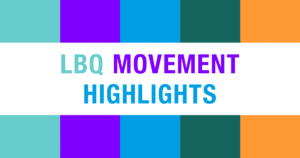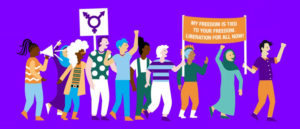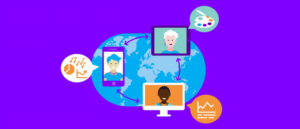‘Most of us cannot be open about our sexuality without the risk of bullying, being fired, or violence. Under the influence of Russian anti-gay propaganda, the climate has not become more friendly in recent years’, says Olena Shevchenko, a founder of the Ukrainian LGBTIQ organisation Insight, a Mama Cash and Astraea grantee-partner. She adds: ‘Of course there is danger, but I will not let my life be determined by it’.
Recent research and analysis, including Mama Cash and Urgent Action Fund’s report Standing Firm: Women- and Trans-Led Organisations Respond to Closing Space for Civil Society, have underscored that both women’s and LGBTQI[1] rights are under attack throughout the world.
 People whose sexualities or gender identities are non-normative are often among the first targets in this broader context of closing space.
People whose sexualities or gender identities are non-normative are often among the first targets in this broader context of closing space.
Nevertheless, every day, in countries around the world, lesbian, bisexual and queer (LBQ) activists like Olena are organising in their communities to say we exist.
They are demanding their right to live free from violence and exclusion and free to enjoy bodily autonomy and safety.
New research documents LBQ activists’ movement and funding priorities
In 2016, Mama Cash and Astraea Lesbian Foundation for Justice launched a multi-year initiative to better understand LBQ activism around the world, especially in the Global South and East.
 We knew that past research on funding for LGBTQI activism suggested that only a small part of total funding was being directed to groups led by LBQ women and LBQ gender non-conforming people.
We knew that past research on funding for LGBTQI activism suggested that only a small part of total funding was being directed to groups led by LBQ women and LBQ gender non-conforming people.
And we heard from our LBQ partners that they often felt ‘invisible’ or that they didn’t ‘fit’ funders’ frameworks focused on women’s or LGBTQI rights.
To better understand the current state of LBQ activism and its resourcing needs, Astraea and Mama Cash talked with over 100 activists from around the world.
We began with a series of consultative meetings and interviews to establish activists’ visions and priorities. We saw this as a necessary step to shed light on how donors’ responses can be better aligned with movement needs.
Activists shared that despite the challenges they face, they see a bright future.
Their agenda is affirmative and focused around three thematic areas: self-determination and bodily autonomy; freedom and safety; and power, resources and environmental interdependence.
We also heard from LBQ activists that their agendas are usually intersectional[2].
Importantly, LBQ people are present in all social justice movements
This includes movements for Indigenous rights, disabled people’s rights and climate justice, and their lives and experiences also form part of those agendas.
One result of this initial phase of the initiative is an infographic that captures LBQ activists’ visions of the future and what they think it will take to get there.
 The infographic provides an accessible visual introduction to some of the pillars of LBQ activists’ work around the world.
The infographic provides an accessible visual introduction to some of the pillars of LBQ activists’ work around the world.
For example, language justice comes up as a key strategy activists are taking on in their work—making sure that materials are translated and that meetings are held in local languages.
Increased funding is needed in order to achieve activists’ visions of justice and liberation, but many other needs emerged as well, including the call for South-to-South learning exchanges between activists, and attention to addressing security needs, activist self-care and burnout prevention.
Next steps
We have listened over the past two years, and hope the infographic reflects some of the key messages that activists want us as donors to hear.
In 2018, we are continuing with a second phase of the initiative.
This will include further data collection to map resourcing needs, available funding and funding gaps. We will continue to share our learning as we move forward and look forward to having this conversation with our peer funders.
Susan Jessop is Senior Officer for Content Development at Mama Cash.
Click here for more content, written to celebrate International Women’s Day 2018.






Comments (0)